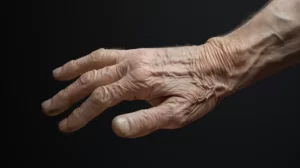Eczema, also known as dermatitis, is a common skin condition that causes dry, itchy, and reddish rashes. Although not considered a severe health issue, research has shown that eczema can significantly increase your risk of bone fractures. A study by Northwestern Medicine found that within a year of being diagnosed with eczema, the chances of experiencing accidental injuries and broken bones rises considerably.
The Link to Eczema Treatments
Researchers believe the increased risk is connected to the side effects of drugs used to treat the condition, as well as the consequences of under treating some cases. As Jonathan I. Silverberg, a dermatologist and researcher, explains, “Many eczema patients who are prescribed medication for itch are often given sedating antihistamines or steroids, but those medications may come at a price.”
Sedatives cause fatigue, and steroids can lead to bone density problems and osteoporosis. Silverberg started his research when he noticed many of his eczema patients were experiencing accidents.
The Dangers of Eczema Itchiness
More than 10% of Americans have eczema, and about a third of them experience moderate-to-severe symptoms. The itchiness caused by the rashes can be extremely distracting, impairing a person’s ability to function normally at work and perform everyday activities.
“The itch is waking patients up from their sleep at night, much in the way that chronic pain patients have difficulties sleeping,” Silverberg said. His study, based on national statistics, showed that within a year of developing eczema, your overall risk of injury increases by 44%. For those over 30, the increased risk goes up by almost 90%.
Staying Safe With Eczema
Until better treatment options are developed to manage eczema and its itchiness, doctors should inform patients about the side effects of their medication and encourage caution. Avoiding situations such as driving while under the influence of sedating antihistamines is essential.
In the meantime, people with eczema can adopt several strategies for relief without relying solely on medications. Here are some helpful tips:
1. Moisturize Regularly
Keeping your skin moisturized can help alleviate symptoms by preventing dryness and cracking. Use a fragrance-free, hypoallergenic moisturizer like this one several times daily, particularly after showering or bathing.
2. Use Gentle Soaps
Regular soaps can often worsen eczema symptoms, so try using a mild, unscented soap that doesn’t contain harsh chemicals or irritants. You may also want to use an unscented laundry detergent to avoid potential irritation from clothing.
3. Take Cooler Showers
Hot water can strip the skin of its natural oils, making symptoms worse. Aim for lukewarm showers instead, and avoid hot tubs and saunas.
4. Reduce Stress
Stress is a known trigger for eczema flare-ups, so finding ways to manage stress can be beneficial. Techniques such as deep breathing, meditation, or engaging in relaxing hobbies can help to keep stress levels in check.
5. Identify Your Triggers
Eczema flare-ups can occur for a variety of reasons, such as allergens, overheating, or contact with certain clothing materials. Identifying your unique triggers can help you to avoid them and keep your symptoms under control.
6. Elevate Your Diet
Some experts believe that an anti-inflammatory diet can help alleviate eczema symptoms. This includes consuming foods rich in omega-3 fatty acids, such as fish and flaxseed oil, and avoiding processed foods and sugars.
By incorporating these strategies, individuals with eczema can manage their symptoms and reduce the risks associated with the medications often prescribed for the condition.



